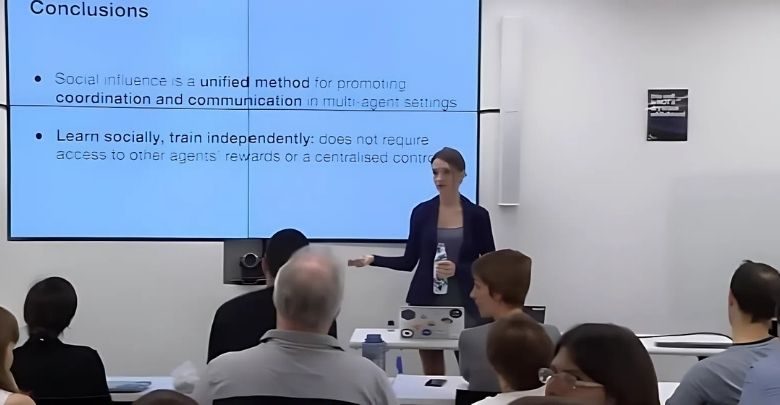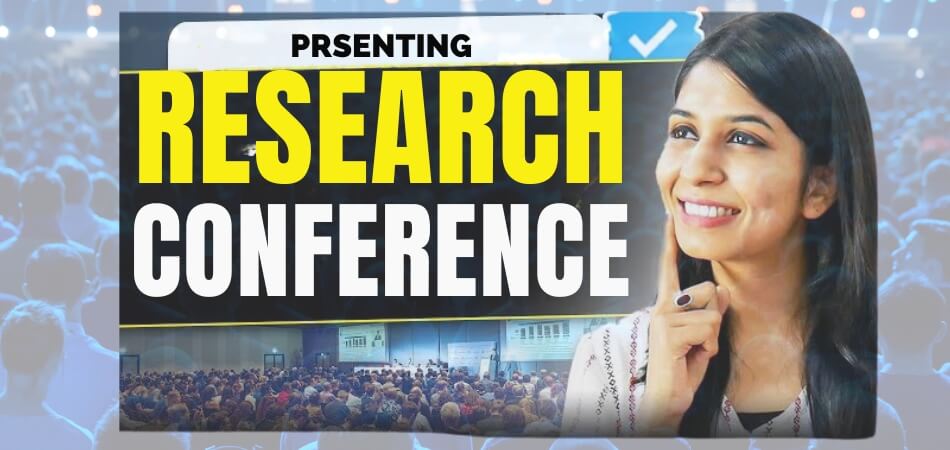An exciting opportunity to share your work with peers and have fruitful conversations is presenting your research at a reputable conference. For many researchers, finding the right one can feel challenging and brings up a crucial question: How to choose a good conference for presenting research?
Choosing the right conference requires careful consideration of several key factors. First, ensure that the conference aligns with your research focus and goals. Look for events with a strong reputation, relevant audience expertise, and networking opportunities. Additionally, consider factors such as location, publication options, and the availability of workshops or sessions that can enhance your experience.
Would you like to learn more about how to choose the best conference for your research? This guide dives into every essential factor, giving you the insights needed to make an informed choice and maximize the benefits of your presentation.
Why Does Presenting at the Right Conference Matter?
For researchers looking for visibility and networking opportunities, choosing the appropriate conference to present at is essential. A well-chosen, reputable event increases the reach of research, offering visibility to industry leaders and potential collaborators. This platform allows researchers to share insights, attract feedback, and increase their work’s impact effectively.

The audience present plays an essential role in a research presentation’s success. When speaking to interested peers, researchers receive focused attention and informed feedback. Connecting with people who share similar interests provides an ideal space for new insights and potential partnerships, strengthening the research’s overall impact and direction.
A strategically chosen conference can also influence career advancement. Researchers can discover mentors, collaborators, or even job opportunities by presenting to a relevant, engaged audience. Early-career professionals often benefit significantly, gaining recognition within their field while building valuable professional networks that support long-term success and growth.
For researchers, it’s imperative to choose a conference for presenting research that aligns with their field’s needs and goals. The right conference amplifies the research’s reach and influence, offering recognition, essential feedback, and professional connections. Missteps in choosing a venue could mean missed opportunities for impactful networking and development.
What Makes a Conference Good for Presenting Research?
A successful conference for presenting research succeeds on several key factors. These elements increase dedication, encourage meaningful discussions, and create an environment where ideas can flourish. Knowing these aspects can lead to a more productive conference experience.
Audience Engagement
Engaging the audience is vital for a successful conference presentation. Presenters must connect with attendees to make their research relevant and relatable. Using simple language and visual aids helps ensure complex ideas are understandable. Interactive Q&A sessions foster dialogue, encouraging attendees to delve deeper into the topics presented.
Networking Opportunities
Effective networking opportunities significantly enhance the conference experience for both presenters and attendees. Engaging with peers, experts, and industry leaders leads to valuable collaborations and partnerships. Conferences often feature social events, allowing informal interactions that build connections, opening doors for future research collaborations and job opportunities within the community.
Diverse Perspectives
Incorporating diverse perspectives into conference sessions enriches the overall discussion and promotes a comprehensive understanding of the subject matter. Presenters should aim to include varied viewpoints and approaches. Embracing diverse ideas can inspire innovative solutions and encourage new research directions within the broader research community and beyond.
Quality of Presentations
Excellent quality presentations maintain audience interest throughout the conference. Clear organization and a well-structured format effectively convey ideas.
Presenters should use concise language, focusing on key points to increase clarity. Engaging storytelling techniques and effective visuals complement the presentation, ensuring that research resonates with the audience and remains memorable.
Feedback Mechanisms
Implementing effective feedback mechanisms enhances the conference experience for all involved. Collecting feedback helps organizers improve future events and address participants’ needs. Attendees should have opportunities to share their thoughts on sessions and topics covered. Constructive criticism fosters personal and professional growth for researchers, promoting continuous improvement.
Several components that improve networking, presentation quality, and engagement are necessary for a successful conference where research is presented. Focusing on these factors can lead to a rewarding experience for everyone involved.
How to Choose a Good Conference for Presenting Research?
When selecting a conference to present your research, you must be aware of certain factors that support your objectives. Identifying a conference that meets these requirements can enhance your experience and ensure your work gains visibility. Here are those factors to keep in mind.
Conference Focus and Scope
Selecting a conference with a focus and scope that aligns with your research is crucial. The conference theme should complement your field and increase your work’s relevance. An appropriate scope ensures your presentation resonates with attendees, creating more interest and engagement in your findings.
Audience Expertise
Considering the expertise level of the conference audience helps maximize the impact of your presentation. A well-matched audience offers opportunities for meaningful feedback and collaboration. Presenting to knowledgeable attendees allows you to engage more effectively, especially when introducing complex concepts within your research field.
Location and Accessibility
A key factor in the overall conference experience is location, which influences networking and accessibility. Accessible locations attract a diverse group, creating richer interactions. Conferences with a central or well-connected location make it easier for international participants to attend, expanding potential networking opportunities.
Presentation Format Options
Many conferences offer varied formats for presenting research, including oral presentations, poster sessions, and panels. Choose a conference with a format that suits your presentation style and research needs. Some conferences also welcome presenting unfinished research at a conference, allowing for insightful feedback on early findings.
Publication Opportunities
Your presentation will be more valuable if the conference provides publication options like journal partnerships or proceedings. Consider conferences that provide opportunities to publish your work, as this can enhance your research’s visibility. Publication avenues ensure a lasting impact and contribute to your academic profile.
Networking Events and Workshops
Offering structured interaction, workshops and networking events that are incorporated into the conference program improves the experience. These events allow attendees to connect with industry leaders and potential collaborators. Conferences that prioritize networking help foster long-term relationships and open doors to new research collaborations.
Conference Reputation and Community
The value and impact of a conference are reflected in its reputation within your research community. Conferences with a strong reputation attract reputable researchers and industry leaders, enhancing your experience. Attending well-regarded conferences provides credibility to your work and strengthens your professional network.
Selecting the right conference for presenting research can influence your project’s success and visibility. By focusing on these essential factors, you can find a conference that best aligns with your academic and professional goals.
Should You Aim for a Local or International Conference?
When considering conference options, deciding between a local or international event can shape the entire experience. Each choice brings unique benefits and challenges, influencing networking, learning, and career growth. Knowing which factors to weigh can help make the right decision. Here’s a closer look at what to consider:
Accessibility and Travel Requirements
For both domestic and foreign conferences, accessibility has an impact on time, money, and convenience. Local events usually need minimal travel, reducing both time and expense. International conferences, however, require more preparation, higher travel costs, and careful logistics management. Each option influences how attendees balance professional obligations with conference activities.
Cultural and Regional Relevance
Presenting locally often aligns with regional topics, resonating well with a familiar audience and addressing local concerns. International events, by contrast, offer cultural diversity, exposing attendees to global issues and broader perspectives. This choice impacts how research connects with audiences and how insights relate to diverse global challenges.
Scope of Visibility
Conference type directly impacts the visibility and the reach of presented research or work. Local conferences allow focused engagement within specific communities or industries, strengthening connections in those areas. International conferences, however, provide broader visibility, connecting presenters to global networks. Each environment influences the reception and impact of the research shared.
Resource Availability
Local conferences often require fewer resources due to lower travel costs and reduced logistical needs. International events, meanwhile, offer access to more extensive resources, from specialized workshops to global industry insights. The choice between local and international affects how attendees prepare and the type of learning and growth opportunities available.
Career Advancement Opportunities
The choice between local and international conferences affects career opportunities and networking. Local events foster connections within a specific region, useful for building relationships in that area. International events offer wider networks, broadening professional relationships worldwide. Each type of event influences career growth and potential connections for future collaborations.
Selecting between a local and international conference depends on one’s goals, resources, and desired impact. Each type offers unique advantages, so thoughtful consideration leads to a more rewarding conference experience.
Tips for Making the Most of Your Conference Presentation
Maximizing your conference presentation means effectively conveying your research while engaging the audience. By focusing on key techniques, you can ensure a successful presentation experience that leaves a lasting impact on your listeners.
Preparing a Clear Message
Having a clear, concise message ready guarantees that your audience understands the main points of your study. Reduce complex ideas into simple points and emphasize essential findings. Avoid excessive details that could cloud your message, allowing listeners to easily follow and retain the most important takeaways from your presentation.
Structuring Your Presentation
A well-structured presentation builds interest and guides the audience through your research. Start with an engaging introduction, and organize your conference style presentation in a logical sequence that highlights major points and findings. Conclude with a strong summary to reinforce the key aspects of your work. This structure makes the presentation more cohesive and impactful.
Using Visuals to Improve Understanding
Strategic use of visuals, like charts, images, and graphs, helps clarify complex information. Well-designed slides emphasize key points and provide context without confusing the audience. Keep visuals clean and relevant, using them to reinforce—not replace—your spoken words, helping attendees retain the main ideas of your research.
Practicing for Confidence
You can present more confidently and with ease if you practice a lot. Run through your presentation multiple times to refine timing, flow, and delivery. Familiarity with the material lets you focus on engaging with the audience, ensuring a seamless presentation, and reducing any nerves that may arise during the live event.
Engaging with the Audience
Interacting with the audience helps keep their attention and encourages involvement in the presentation. Eye contact, questions, and open body language build rapport. Engaging directly creates a dynamic environment where attendees feel connected to your research, fostering a deeper understanding and leaving a stronger impression.
Making the most of your conference presentation relies on preparation, clarity, and audience engagement. Applying these tips ensures a memorable, impactful experience that strengthens your professional presence and enhances your research’s visibility.
Frequently Asked Questions (FAQs)
Choosing the right conference for presenting research can be pivotal in shaping your career, building valuable networks, and gaining crucial insights. Below, we address common questions to help you make an informed decision about selecting the ideal conference.
What Factors Should I Prioritize When Choosing a Conference?
When choosing a conference, focus on aspects like its theme alignment with your research, the reputation within your field, and the audience type. Prioritize events that match your professional goals, offer diverse networking opportunities, and align with your expertise for the best possible experience and recognition.
How Can I Measure a Conference’s Reputation?
To measure a conference’s reputation, check if it’s backed by reputable organizations, prominent researchers, or industry leaders. Read past attendees’ reviews, explore published proceedings, and verify if it’s associated with professional organizations. This research helps you identify credible conferences that support meaningful knowledge-sharing.
Should I Consider a Conference’s Location?
Yes, location matters, especially when planning for international events. Consider if the location offers convenient access, manageable travel costs, and opportunities for wider exposure. A well-situated conference can make networking and engagement easier, providing a more enriching experience and better connections with attendees worldwide.
How Important Is the Conference Size?
Conference size affects engagement and networking opportunities. Smaller conferences often foster deeper discussions and more direct feedback, while larger ones offer broader visibility and networking. Choose a size that aligns with your goals—whether focused interaction or broader exposure suits your research objectives best.
Can Virtual Conferences Be a Good Option?
Virtual conferences are increasingly valuable, offering global access without travel. They can be cost-effective and allow broader participation, making them a solid choice if in-person attendance is challenging. Evaluate whether the virtual conference platform supports meaningful interaction and feedback for a productive experience.
Bottom Line
Selecting the right conference is crucial to maximizing your research’s impact and reach. By considering the conference’s theme, audience, reputation, and accessibility, you can ensure it aligns with your research goals and professional needs, fully answering: How to choose a good conference for presenting research?
As you prepare, focus on key elements like networking opportunities, feedback mechanisms, and conference format to enhance your experience. Remember, the right choice opens doors to growth and collaboration. Best wishes for a successful and rewarding conference presentation!







